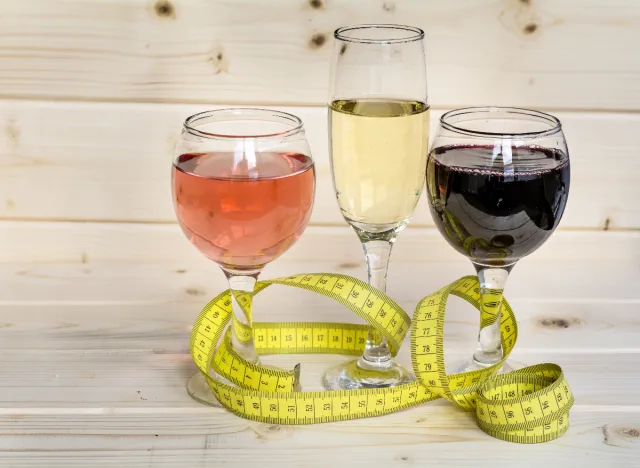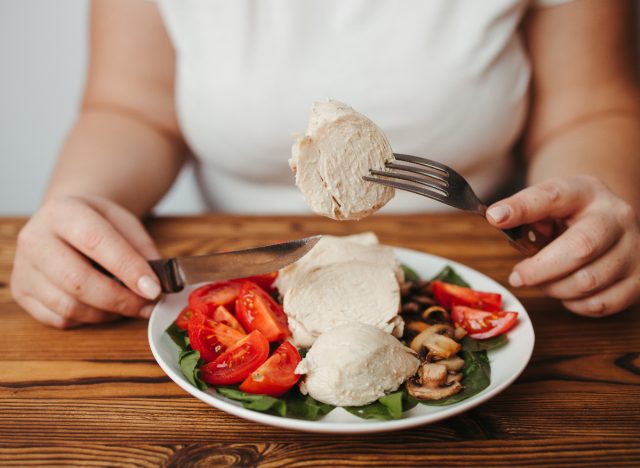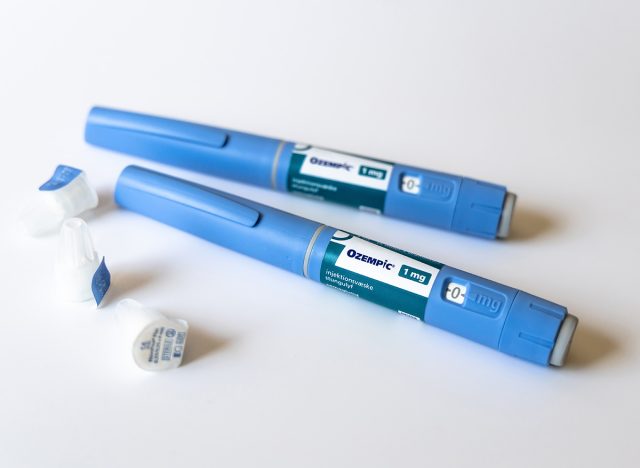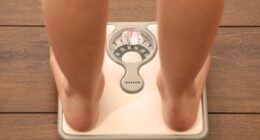Emily Simpson is addressing her “haters” and letting them, as well as her fans, know that she’s in a great place healthwise and she’s back to the size she was in her 30s and early 40s. “I’m feeling the healthiest, fittest, and strongest I’ve felt in over 7 years,” the Real Housewives of Orange County star wrote in a recent Instagram post. “I have more energy than I’ve had in years, and I wake up every morning at 6 am happy, healthy, strong (mentally and physically), and ready to crush the day with an early morning workout and spend the rest of the day being the best mom and wife I can be.” She added the hashtag “transformation.” Simpson has been forthcoming about struggling with hormone imbalance issues, which has made getting back into shape more challenging, but with a change in diet, working out, the aid of Ozempic, and liposuction, she’s meeting her wellness goals. Here’s a closer look at how the TV personality is cleaning up her diet and what health experts think.


During a Q&A with fans on her Instagram Story, Simpson shared she changed her diet and is sticking to it, which has helped, according to PEOPLE. While she didn’t detail exactly what she eats, she did reveal a combination of a healthy diet and working out together has helped. “I think I struggled over the past seven years because I convinced myself that because I worked out consistently…I could eat anything I wanted…clearly, that wasn’t working!! My age, hormones, and zero testosterone are all factors as well,” Simpson continued. “This is the first time that I’ve actually changed my diet and stuck to it.”
What the Expert Says: Registered dietitian Bess Berger, who specializes in PCOS and menopause, says, “This is a really common issue for women in their 40s. I can’t count the number of times I’ve heard, ‘I am doing everything I used to do and it’s not working.’ Or, ‘If I look at carbs, I gain weight.’ I would start by having a few healthy breakfast options. And that’s it. Get used to the change with breakfast. Let your body adjust and then assess from there.” She added, “Also having more natural, whole foods helps. Most women’s bodies get super particular about food sources as we age. More processed food could be handled in the past and now our bodies require higher quality food. Think of it if you were previously snacking on pretzels or crackers or cheese puffs, your body might now need a Greek yogurt or piece of cheese with fruit or guac and veggies.”


Another way Simpson is meeting her fitness goals is by reducing her alcohol intake. “I didn’t give up anything completely but I definitely cut way back,” she said in the Q&A. “I haven’t drank much at all in the past 8 months.”
What the Expert Says: Nutritionist Rania Batayneh, MPH author of the bestselling book The One One One Diet, says, “The first that comes to mind when we drink (limit) alcohol or quit drinking is fewer calories = weight loss, so essentially reduced liquid calories. While this may be true (unless you are replacing these calories with another food), there are so many more benefits to limiting alcohol.
- Lowered impulse eating: Alcohol can lower inhibitions and increase hunger, leading to overeating or making poor food choices. By cutting back on alcohol, you may find it easier to control your appetite and stick to a balanced diet.
- Improved metabolism: Excessive alcohol consumption can disrupt your metabolism, making it harder for your body to burn calories efficiently. Reducing alcohol intake can help restore a more balanced metabolism, making it easier to manage your weight.
- Better sleep patterns: Alcohol can disrupt sleep patterns, leading to poor-quality sleep. Lack of sleep is associated with weight gain and can make it harder to lose weight. By limiting alcohol, you may experience improved sleep, which is beneficial for overall health and weight management.
- Enhanced physical activity: Excessive alcohol consumption can lead to fatigue and reduced motivation for physical activity. By cutting back on alcohol, you may feel more energized and inclined to engage in exercise, supporting your weight loss goals.”


Not only did Simpson switch up her diet, but she’s also more thoughtful about what she consumes. “I now focus on ‘mindful’ eating, meaning I plan meals and think about what high protein foods I should eat to fuel my body and build muscle.”
What the Expert Says: Batayneh explains, “When Emily says that she stopped ‘mindlessly’ eating and that she realized that she had no clue what she was actually eating in a day I think that this boils down to awareness and understanding what her body’s needs are vs. just eating to eat to get through the day—being busy a mom and wife, filming, managing family and work). I work with a lot of women who are managing home and work life and this is not uncommon.” She adds, “I like also to call mindful eating conscious eating, meaning bringing you to the present moment. Think about what your body needs now.”
READ RELATED: Retinol FAQs: Get Your Facts Right Before You Introduce This To Your Beauty Routine


Using Ozempic for weight loss has been controversial, but Simpson has been open about taking the diabetes drug, as well as getting liposuction to help her stay motivated. “I’m 47 and the past five years have been an uphill battle of hormone issues, menopause, zero testosterone and weight just consistently creeping on no matter how much I worked out,” she told one of her Instagram followers, according to PEOPLE. “The jumpstart helped me completely clean up my diet and dedicate more consistently to the gym.”
What the Expert Says: “Due to the hormonal changes that come along with menopause, Ozempic (Semaglutide) is particularly effective for a sustained weight loss journey in middle-aged women and menopausal women,” Dr. Steven Batash, MD, an expert in non-surgical weight loss procedures, says. “A study comparing GLP-1 agonists showed that Ozempic was a helpful medication used to improve blood sugar control and insulin and had positive impacts on sex hormones and period regularity for peri-menopausal women.”
While Dr. Batash says people can see results with Ozempic, not everyone should take it. “Ozempic isn’t for everyone but it has been shown to help premenopausal women battle the creeping weight gain. It is known that during menopause, women tend to gain extra weight in the midsection. The nature of this weight gain is unhealthy, and if we can utilize Ozempic (Semaglutide) effectively to facilitate weight loss in responsive patients, I believe we should confidently harness its potential.” He adds, “However, it’s important to remember that using Ozempic (Semaglutide) to control weight gain is only one part of the equation and that women should aim to change their behaviors and eating patterns as part of a long-term wellness plan.” He notes, “Getting 8 hours of sleep, weight-bearing exercise, and clean eating are still very much necessary to maintain a healthy weight and good health during and after menopause.”
In her Instagram video, Simpson reveals two exercises she does to stay in shape. “The first one is similar to what’s called a straight arm lat pulldown or cable lat sweep, and it primarily targets your lats and teres minor, which work to extend the arm,” ACE-certified trainer Rachel MacPherson, who is also a nutrition coach, explains.
What the Expert Says: According to MacPherson, “While this exercise is very effective and is an excellent accessory to other compound back movements, such as barbell rows, you can get more from the exercise by standing back from the machine and leaning forward slightly with a small hinge at the hips, fully extending your arms to use a broader range of motion for a bigger stretch, and bringing the rope all the way down to your hips or legs at the bottom. Her range of motion and form is not quite right in this video.”


Another move that also targets the back that Simpson shared herself doing is the TRX row is a pulling-back exercise that works the lats, rhomboids, rear delts, and traps, which is a great workout.
What the Expert Says: “As a more compound pulling exercise, it is very effective for strengthening the back,” MacPherson says. “With the TRX, you can easily adjust the level of intensity based on how far back you lean, with farther back making it more difficult as you work against your body weight and gravity. It’s a good choice for warming up before using a barbell or dumbbell to do a similar movement. Using weights helps you monitor and progress your weight more quickly than with the TRX and body weight, but it’s still a fantastic exercise.”










